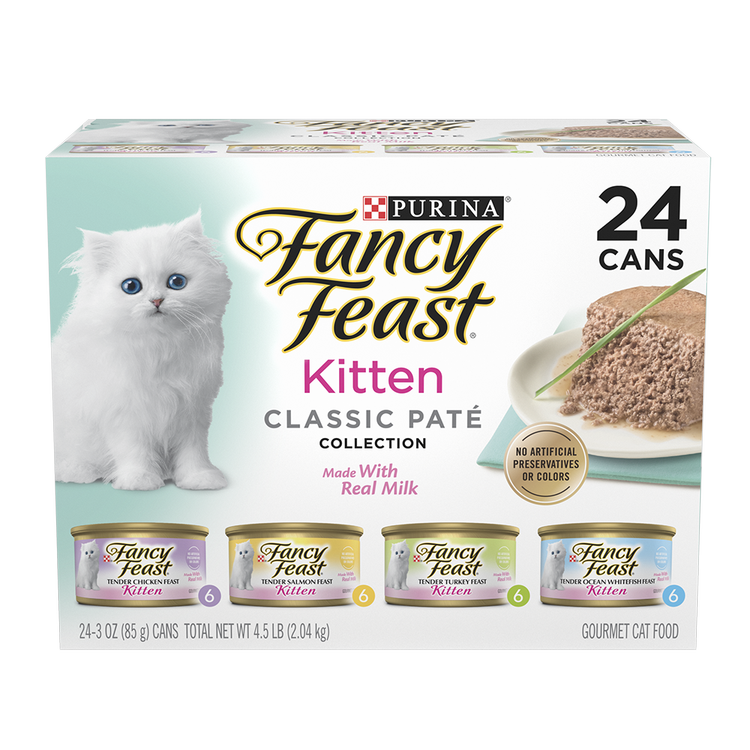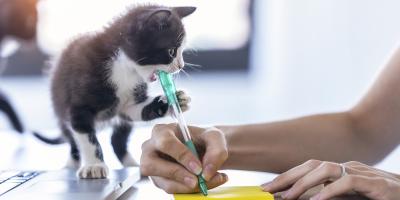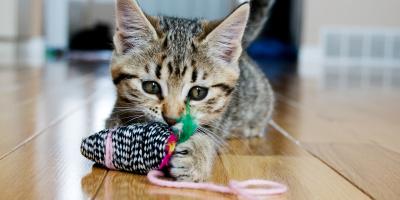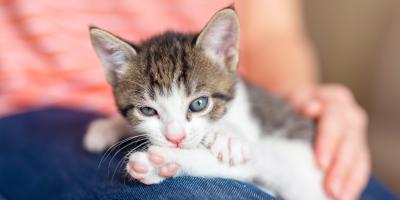Why is Your Kitten Not Eating? Reasons for a Change in Food Intake


Kittens can be fussy eaters. If you’re asking, Why won’t my kitten eat?, know that you’re not alone. Sometimes it’s about the kitten’s personality, and sometimes it’s just about the food. But most often, it is a little bit of both. This article provides the likely reasons why your kitten stopped eating, tips for how to get a kitten to eat, and when to seek veterinary care for picky kittens.
Reasons for a Change in Appetite
Why is your kitten not eating? Kittens are picky not only about the food they eat, but how and where the food is presented. Here are the top 10 reasons why kittens won’t eat the food you’ve prepared:
- Type of bowl – Kittens don’t like their whiskers touching the sides of their food bowls. Known as “whisker fatigue” or “whisker stress,” it can cause kittens to stop eating or start taking their food out of the bowl and eating off the floor. Kittens and cats have highly sensitive whiskers that act as antennae to gather information about their surroundings. If those antennae are activated several times during the meal, it can put kittens off their food. Choose food bowls that are wide and shallow, and ideally made of glass, stainless steel, or ceramic, to prevent whisker stress.
- Location of the Bowl – Where you put the bowl may be as important as what’s inside. Keep the food and water bowls away from the litter box. Make sure the bowl is in a location where your kitten will not be disturbed by children, footsteps, or other pets. Keep in mind, some kitties are just like leopards—they want to eat their food in an elevated location. You might try putting your kitten’s food bowl on a table or shelf where she can get to it, but other pets, especially dogs, can’t reach it.
- Clean bowls – Your kitten may not think the bowl is clean enough, and if it’s a plastic bowl, they may be right. Plastic bowls can harbor smells that may interfere with a kitten’s appetite. Ceramic, stainless steel, or glass bowls can be cleaned more thoroughly than plastic ones. In addition to helping improve your kitten’s appetite, it can reduce the likelihood your cat will develop certain health conditions, such as cat acne, that may be caused by lingering bacteria in plastic bowls.
- Stress – Is your new kitten not eating? A new home, a strange environment, or traveling can be stressful for kittens. If your kitten is stressed, she won’t eat. To provide some extra comfort as your kitten transitions into her new home, ask your breeder, shelter, or rescue if you can keep a toy or blanket from her previous home that will remind your kitten of her old home or her mamma.
- Vaccinations – Reactions to vaccinations are usually mild, but if you think your kitten hasn’t been eating properly after a few days, you should call your vet.
- Toothache or Teething – Kittens can have teething pain just like babies. You might try switching to softer food or moistened dry food to help relieve the discomfort. To be sure it’s not something more serious, ask your vet to conduct a dental exam to rule out any issues with your kitten’s mouth.
- Illness – Upper respiratory infections can cause stuffy noses and reduced appetites. If your kitten was treated with antibiotics for an upper respiratory infection, the antibiotics may have upset her tummy as well. Other illnesses, including intestinal parasites, can also decrease her appetite. If you suspect your kitten may be ill, or if your kitten’s lack of appetite is accompanied by diarrhea, vomiting, or lethargy, contact your vet as soon as possible.
- New Food – Switching your kitten’s food too quickly can upset her stomach, and that can reduce her appetite. Ask the breeder, shelter, or rescue what they were feeding. If it is a high-quality kitten food, try to maintain that diet, and if not, transition to a high-quality kitten food slowly over the course of seven to 10 days.
- New pet – Are there other pets residing in the household or being brought into the home? Meeting the household pets or adding a new pet can cause your kitten stress until they get to know each other. Understand it may take a few days and a little patience for new pet introductions.
- Finicky – Your kitten may just be finicky. Don’t be tempted to add human food to your kitten’s food bowl. All the nutrition she needs is included in her kitten food. If you add other food to the bowl, she’ll look for it and may decline to eat if it’s not there.
Is Your Kitten a Picky Eater?
What should you do if your kitten is a picky eater? Kittens and cats are notorious for being finicky. Unless directed by your vet, don’t add human food to your kitten’s bowl, as she might get fussy when she can’t find those extras in her bowl.
If your new kitten is not eating, or if it seems like your kitten is not eating enough, you should contact your veterinarian for advice. It may simply be that your kitten prefers a different protein source, but you need to make sure there isn’t something else involved.
The best kitten food for picky eaters is the one she wants to eat, as long as it’s complete and balanced for kittens. Cats and kittens like variety. Once you find your kitten’s preferred protein, you might try feeding your kitten one kind of dry kitten food featuring that protein consistently and adding variety by offering different flavors of canned kitten food. Choose different flavors of wet kitten food from the same brand to avoid upsets. With Purina Pro Plan Wet Kitten Food, you can choose from a variety of chicken and seafood flavors.
What to Do if Your Kitten Stops Eating
Does it seem like your kitten is not eating much, but acting normal? Some kittens won’t finish their food because they like to graze throughout the day. If your kitten likes to take a bit here and there, known as free feeding, you can make sure she has food available throughout the day, but veterinarians caution that this type of feeding can lead to obesity.
Adjust your kitten’s feeding environment if there are too many distractions or other pets that make her anxious.
Establish a consistent feeding schedule with the proper amount of food to help your kitten complete her meals. Remember to consult the feeding guidelines on your kitten’s food bag. Different brands and foods have differing nutritional values. After about 12 months for most kittens, you should transition your kitten to adult cat food.
Is it normal for a kitten not to eat? While it’s normal for some kittens to skip a meal now and again, if your kitten is not eating and sleeping a lot or is refusing to eat, it can be a sign of a serious illness.
If your kitten is weak, sleepy and not eating after 24 hours, has stopped drinking water, or shows other signs of illness, like diarrhea or vomiting, contact your vet immediately.
What to Feed a Kitten that is Not Eating
Some people ask, Why is my kitten not eating wet food? While others ask, Why is my kitten not eating dry food? Don’t worry, your kitten will get a complete and balanced nutrition from either source of kitten food.
If your kitten doesn’t like eating dry food, try moistening the kibble, warming it slightly to release the aroma (but not too hot), or mixing with wet kitten food. Likewise, if your kitten prefers dry food and avoids wet food, try mixing a little of the canned food with her kitten kibble. The combination of textures may be more appealing.
There are benefits for your kitten to feeding both wet and dry food. Understand, your kitten will receive complete and balanced nutrition with either one, so long as it is formulated for kittens. Wet food provides extra moisture for those kittens not drinking water but eating regularly.
How to Prevent Loss of Appetite in Kittens
If you and your vet have determined that your kitten is healthy, but just a little picky, here are a few tricks you can try to get her to eat her food when it seems like she has lost her appetite:
- Warm her food to body temperature (99-101ºF) or slightly warmer to boost the food’s aroma, making sure it is not too hot to eat
- Create a peaceful and tranquil environment with minimal distractions where your kitten can eat undisturbed and away from children, footpaths, other pets, and the litter box
- Try a wide, flat bowl made of glass, stainless steel, or ceramic to prevent whisker fatigue
- Elevate the bowl off the floor to a table or shelf
- Before meals, play games with your kitten that simulate stalking and hunting – the natural activity progression for kittens and cats is hunt, eat, groom, then sleep
- Experiment with different protein sources in your canned kitten food – some kittens prefer seafood or chicken – once you’ve determined her favorite, transition the dry food to that protein source
- Establish a routine with a regular feeding schedule
- Add highly palatable toppers, like wet kitten food, to her dry food
If your kitten’s loss of appetite continues despite all your efforts, consult your vet. In addition to assessing your kitten’s health, your vet may be able to recommend appetite-stimulating medications or supplements.
When to Seek Veterinary Care
It’s important to pay attention to any changes in your kitten’s appetite and the amount of food she eats. Call your vet if your kitten is lethargic and not eating or if your kitten is not gaining weight but eating the appropriate quantity of food.
If your kitten has skipped two feedings, is not drinking water, or is still not eating after 24 hours, call your vet. Likewise, if your kitten’s lack of appetite is accompanied by vomiting or diarrhea, contact your vet.
If she shows signs of low blood sugar, such as weakness, tremors, lethargy, or seizures, call your vet immediately. This is a life-threatening situation.
If your kitten is showing symptoms of dehydration, such as panting, dry gums, loss of skin elasticity, constipation, lethargy, or vomiting, she needs immediate medical intervention.
With these tips, we hope you can make a few adjustments to your kitten’s feeding routine and get her back on a healthy path. But, if you continue to be concerned about your kitten’s eating habits, talk to your vet.
For more expert tips on the health of your kitten, explore our other kitten health articles.

Be Rewarded for Your Purina Purchases
Earn and redeem points for Purina products with myPurina app.





